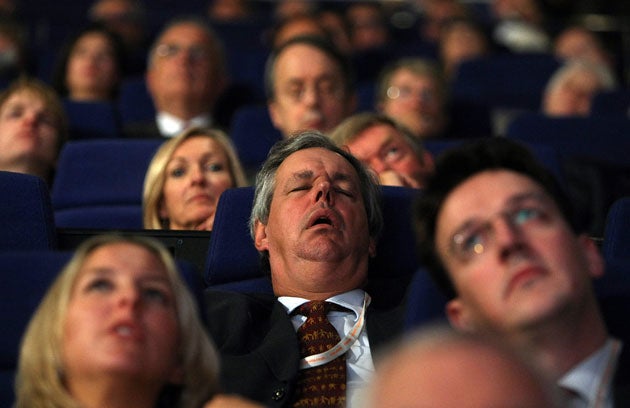Cameron's charm fails to halt slide in party membership
Local Tory parties have lost almost a quarter of rank-and-file members since their leader took over

Your support helps us to tell the story
From reproductive rights to climate change to Big Tech, The Independent is on the ground when the story is developing. Whether it's investigating the financials of Elon Musk's pro-Trump PAC or producing our latest documentary, 'The A Word', which shines a light on the American women fighting for reproductive rights, we know how important it is to parse out the facts from the messaging.
At such a critical moment in US history, we need reporters on the ground. Your donation allows us to keep sending journalists to speak to both sides of the story.
The Independent is trusted by Americans across the entire political spectrum. And unlike many other quality news outlets, we choose not to lock Americans out of our reporting and analysis with paywalls. We believe quality journalism should be available to everyone, paid for by those who can afford it.
Your support makes all the difference.David Cameron's charm offensive has failed to attract new members to the Tories – or keep hold of tens of thousands of people who were already in the party when he arrived.
Local Conservative parties have lost almost a quarter of their rank-and-file members since Mr Cameron took over in late 2005.
Although the Tories have enjoyed a huge opinion-poll lead for several months, they have not been able to translate the surge in popularity into an increase in membership on the scale experienced by Labour during Tony Blair's early years in charge.
The total membership in more than 200 constituency associations – barely a third of the overall number – who provided relevant figures to the elections watchdog fell from 185,000 to 145,000 between December 2005 and December 2008. The constituencies experiencing falls include "safe" seats, the bases of shadow Cabinet members and target seats that must be taken if the Tories are to win the next general election.
In Mr Blair's first year as Labour leader, his party's membership rose by over 100,000 to 320,000.
Elections experts last night said that, despite his electoral popularity, the figures suggest that Mr Cameron has failed to convince enough individuals to back his "project" with their cash – or campaigning efforts. The details come after it emerged that the Conservatives had collected £6.4m in donations between April and June this year, with some £2.5m alone coming from wealthy City financiers.
Dr Tim Bale, the author of the forthcoming book The Conservative Party: From Thatcher to Cameron, said the Tories were suffering from a general decline in the traditional status of political parties as mass movements.
But he added: "Local effort – canvassing, leafleting, market stalls – can and does make a significant difference to a party's vote. Given how far ahead the Tories are in the polls at the moment, one could argue that they needn't worry too much about this. But if things tighten – if the country climbs out of recession more quickly than predicted, and, above all, if Labour dumps Brown and replaces him with someone more voter-friendly, then the size of Cameron's majority may depend on getting people to go out and knock on doors."
Peter Facey, of the constitutional pressure group Unlock Democracy, said the Tories had abandoned their traditional reliance on the contributions of hundreds of thousands of individuals. "In terms of fundraising, they have taken the New Labour route, with dinners and '1,000 clubs', getting more people to give quite large sums of money. The idea of people paying to be party members in large numbers is over – partly because many of the older members have died off – and the Tories realise that."
All local political parties in Britain are required to provide the Electoral Commission with their annual reports and accounts every year. Some 229 local Conservative Associations presented membership figures for both 2005 and 2008. An analysis of the returns shows the associations lost more than 40,000 paying supporters during Mr Cameron's first three years in charge.
Many of the local parties blame the economic climate for the plummeting figures. They have added "unofficial" members, including those paying for regular dinners with MPs, to their full lists.
A Conservative Party spokesman said Mr Cameron retained a broad-ranging support within the country at large. The Tory leader has been calling for a limit of £50,000 on individual donations to political parties, to widen their appeal. The spokesman said financial returns showed the party had the widest range of supporters of all parties.
Join our commenting forum
Join thought-provoking conversations, follow other Independent readers and see their replies
Comments